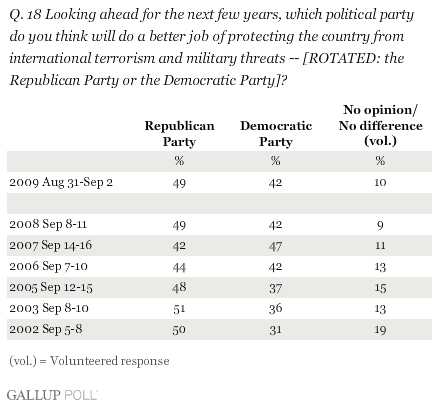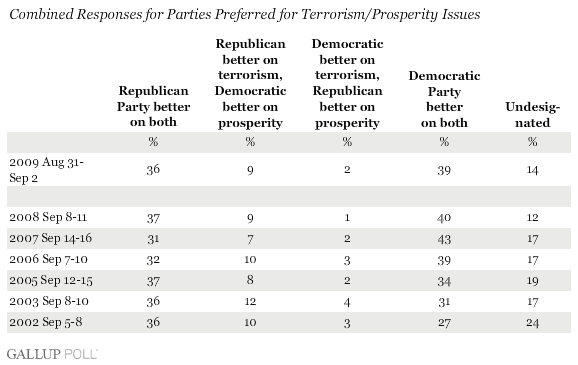PRINCETON, NJ -- Americans continue to give the Republican Party a slight edge over the Democratic Party -- 49% vs. 42% -- in their perceptions of the party that will better protect the United States from international terrorism and military threats. The Republicans' edge on this issue is unchanged from last year but has diminished from earlier in the decade.
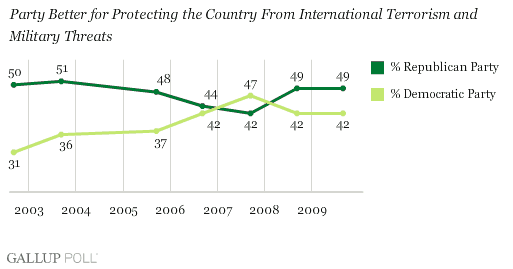
"Since 9/11, the Republicans have led the Democrats in most yearly updates of the question on terrorism, with the exception of 2006-2007 (periods when Bush's approval rating was below 40%)."
���۴�ýinstituted this question in September 2002, a year after the 9/11 terrorist attacks against the United States. At that time, with President George W. Bush's approval rating approaching 70%, the Republicans had a substantial advantage over the Democrats as to which party would better protect the country from terrorism, 50% to 31%.
Since 9/11, the Republicans have led the Democrats in most yearly updates of the question on terrorism, with the exception of 2006-2007 (periods when Bush's approval rating was below 40%).
The Republicans rebounded to a 49% to 42% advantage on the issue in 2008 -- identical to today's margin. It is not entirely clear why the Republican Party resumed its lead over Democrats on the terrorism issue in 2008, with . However, that survey was conducted just days after the Republican National Convention, which advanced a major national security theme built around John McCain's military credentials.
Democrats Lead on Maintaining Prosperity
The new results are from an Aug. 31-Sept. 2 survey in which ���۴�ýalso asked Americans which party is better for keeping the country prosperous -- a question instituted in 1951. Democrats currently lead on that measure by 50% to 39%, marking the fourth straight year in which the party has held a double-digit advantage.
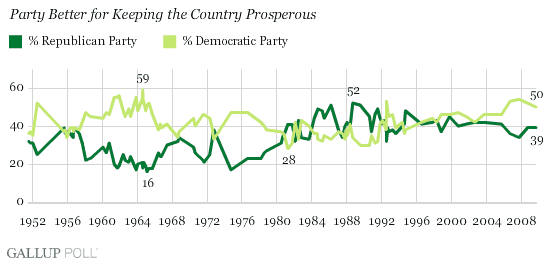
Republicans have not have not held a significant lead over Democrats on the prosperity measure since September 1994 -- and in November of that year, the Republican Party won majority control of Congress for the first time in 40 years. However, several times since then (including 2001-2003, 1999, and 1996-early 1998), the parties have been at about parity on the measure.
Partisans Line Up Accordingly
Naturally, the results for both party-preference questions are highly partisan. However, beyond the strong party loyalty of Republicans and Democrats, the variation in the extent of that loyalty, as well as in the attitudes of independents, is revealing.
Evenly balanced perceptions of the party that is better on a given issue would require the same percentage of Republicans and Democrats to name their own party as better, and independents to split evenly. However, that is not the case for either issue in this discussion, particularly with respect to terrorism.
Ninety-one percent of Republicans say the Republican Party will do a better job of protecting the country from terrorism. By contrast, a slightly smaller percentage of Democrats (84%) name their party as better on terrorism. Independents choose the Republicans by a wide margin, 52% vs. 31%.
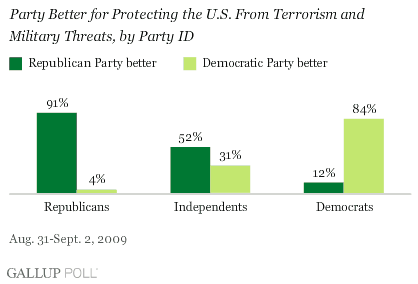
Conversely, regarding which party can do a better job of keeping the country prosperous, slightly more Democrats than Republicans choose their own party (94% vs. 83%, respectively). Independents in this case are evenly divided, with about 40% choosing each party.
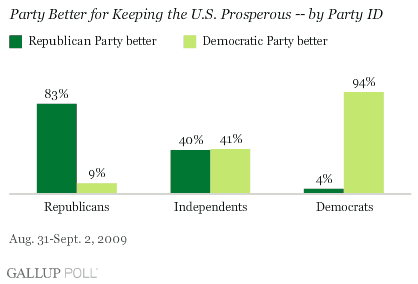
Bottom Line
Dwight Eisenhower ran for president in the 1950s on a platform of "Peace, Prosperity, and Progress." It's an elusive trio of goals that he, and every president since, has strived for with uneven success.
Half a century later, the threat of international terrorism is a pressing concern and the nation's economic climate is the worst it has been in decades. Americans would no doubt welcome a leader or political party that could provide the best solutions on both fronts. However, with more Americans naming the Republican Party as better on national security and more naming the Democratic Party as better for "prosperity," today there is clearly a split decision.
Survey Methods
Results are based on telephone interviews with 1,026 national adults, aged 18 and older, conducted Aug. 31-Sept. 2, 2009. For results based on the total sample of national adults, one can say with 95% confidence that the maximum margin of sampling error is ±4 percentage points.
Interviews are conducted with respondents on land-line telephones (for respondents with a land-line telephone) and cellular phones (for respondents who are cell-phone only).
In addition to sampling error, question wording and practical difficulties in conducting surveys can introduce error or bias into the findings of public opinion polls.
